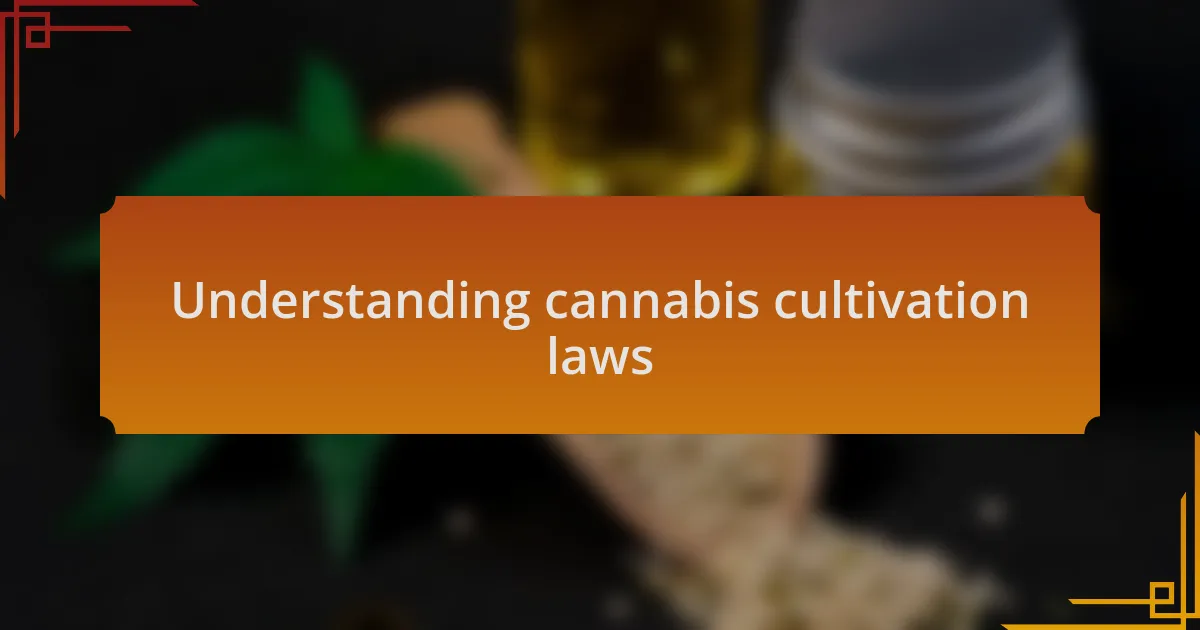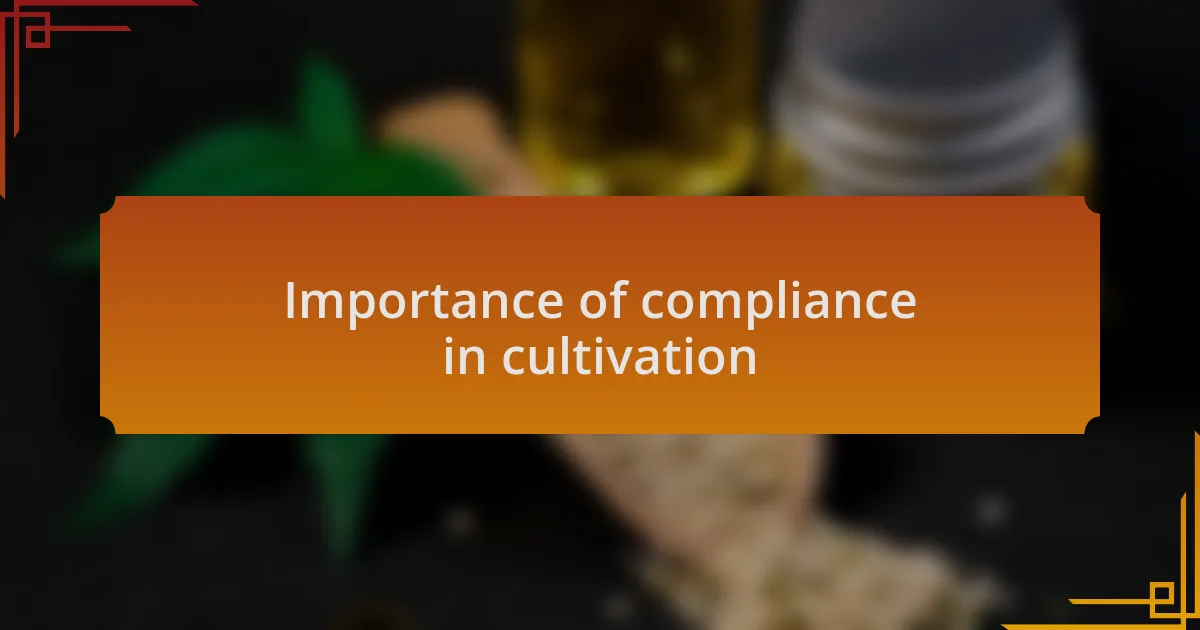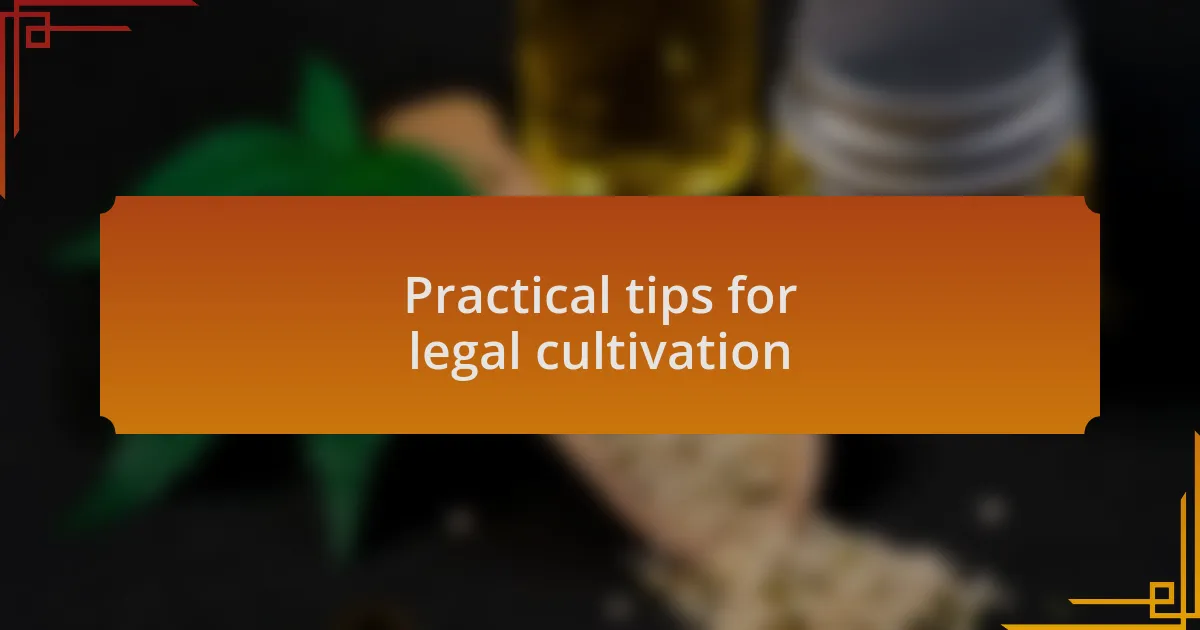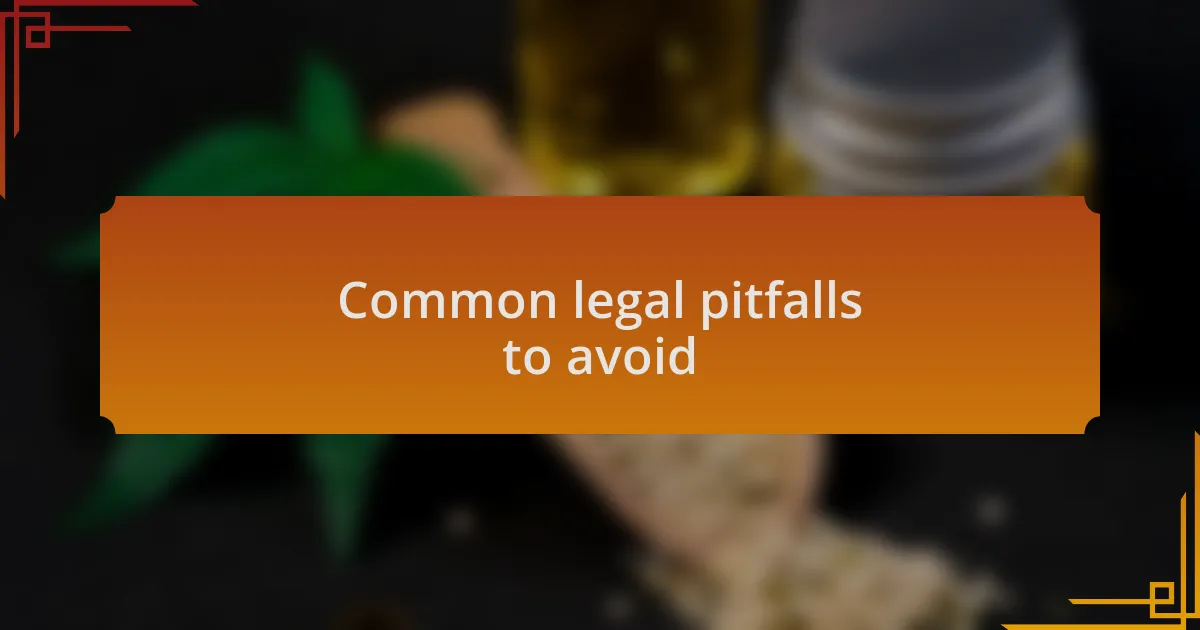Key takeaways:
- Understanding both state and local cannabis cultivation laws is crucial as they can differ significantly, impacting compliance and legal standing.
- Maintaining detailed records and engaging with local regulatory bodies can enhance compliance and operational efficiency in cannabis cultivation.
- Awareness of licensing requirements, including local zoning laws and plant count limits, is vital to prevent legal issues and ensure the success of your cultivation operation.
- Continuous education through local workshops and community engagement is essential to stay updated on evolving regulations and best practices.

Understanding cannabis cultivation laws
Navigating cannabis cultivation laws can feel overwhelming, especially since they vary so widely from state to state. I still remember the first time I delved into these regulations; the sheer volume of documents and legal jargon made my head spin. It’s crucial to understand that what may be legal in one location could land you in hot water just a few miles away.
Many people overlook the importance of local rules, assuming that state laws are sufficient. For instance, I learned the hard way that while my state permitted cultivation, my municipality had its own restrictions that I had to follow. How can you ensure compliance? Always check both state and local laws, as they often provide specifics on plant counts, secure storage, and even the zoning of your cultivation site.
Another aspect you can’t ignore is the ongoing evolution of these laws. Just last year, for example, I was following some proposed changes that could have drastically altered the cultivation landscape in my area. It’s a reminder that staying informed isn’t a one-time task; it’s a continuous commitment. So, how do you keep up with these changes? Engaging with local cannabis advocacy groups or checking official state websites can provide timely updates and support for any legal queries you might have.

Importance of compliance in cultivation
Maintaining compliance in cannabis cultivation is not just a matter of legality—it’s essential for the sustainability of your operation. I’ve seen cultivators charged hefty fines simply because they overlooked a minor detail in their local regulations. It’s easy to think that as long as you’re following the law broadly, you’re in the clear, but these small oversights can have significant financial consequences.
What’s more, the reputation of your cultivation practices hinges on compliance. When I was starting out, I connected with a grower who faced severe backlash from the community after a compliance issue made headlines. It showed me that ethical practices and adherence to the law bolster not only your credibility but also your relationship with the surrounding community. After all, who wants to work with someone seen as a liability?
I often reflect on the rigorous tracking systems I’ve implemented to ensure compliance. It’s a small investment of time that pays off in peace of mind and operational efficiency. Have you thought about how keeping detailed records can save you trouble down the line? For me, knowing I have everything documented helps me sleep at night, allowing me to focus on what I love: cultivating healthy, thriving plants.

Navigating state-specific regulations
Navigating state-specific regulations can initially feel like navigating a labyrinth, but I’ve found that breaking it down into manageable steps makes it much more approachable. When I first entered the industry, I remember spending countless hours reviewing my state’s regulations, feeling overwhelmed by the legal jargon. I soon realized that reaching out to local experts and joining community forums was invaluable; the insights I gained from fellow cultivators often illuminated the path forward.
Each state can have vastly different regulations, and I’ve learned that what works in one place may not work in another. For instance, I was surprised to discover the restrictions on the number of plants allowed in my current state compared to where I previously cultivated. This discrepancy taught me the importance of continually updating my knowledge as regulations evolve. Have you taken the time to stay current on your local laws? It’s not just about compliance; it’s about making informed decisions that will safeguard your investment.
To further ensure compliance, I’ve found that developing relationships with local regulatory bodies pays dividends. When I met with a local inspector during a compliance training session, I understood firsthand what they look for in inspections. That personal connection actually transformed my approach; now, I proactively seek feedback. Engaging with regulators not only enhances my understanding but helps demystify the process, allowing me to cultivate with greater confidence.

Familiarizing with licensing requirements
Understanding licensing requirements is one of the most critical steps in cannabis cultivation. When I started, I remember the dread I felt at the mere thought of navigating the licensing maze. I learned quickly that each license type comes with its own set of stipulations, often requiring detailed applications that demand precision and clarity. Have you ever faced paperwork that feels overwhelming? It’s essential to approach this with patience and thoroughness.
In my experience, connecting with others who have gone through the licensing process can be a game changer. I vividly recall attending a local workshop where a seasoned cultivator shared their licensing journey. Their insights not only clarified common pitfalls but also empowered me to tackle my own application with newfound confidence. It struck me how collaboration in this community can transform the daunting process into a more manageable endeavor.
As I familiarized myself with the licensing landscape, I discovered that ignorance can be costly. Early on, I made a mistake by underestimating the importance of local zoning laws. A simple misstep almost derailed my project before it began. This taught me to conduct a thorough research on regulations specific to my location—because every detail matters. Have you taken the time to research your local landscape? Trust me, it’s an investment that pays off in the long run.

Practical tips for legal cultivation
When I first started cultivating, I quickly realized that keeping detailed records was essential. Not only does this help in maintaining compliance with regulations, but it also aids in tracking your plants’ progress. Have you ever thought about how much easier it is to refine your techniques when you can look back at what worked and what didn’t? I found that documenting everything—from germination dates to nutrient schedules—turned my growing experience into a science rather than just a hobby.
One practical tip I can offer is to invest time in learning about local agricultural best practices. I remember attending a community garden meeting where experts shared resource-efficient methods that comply with legal standards. Not only did I leave that meeting with practical skills, but I also felt a sense of connection to fellow growers who were equally passionate about staying within the law. Engaging with local groups not only enhances your knowledge but also builds a support network that can be invaluable.
Lastly, staying updated on changes in legislation is crucial. It’s not uncommon for regulations to evolve, and I’ve learned the hard way how being unaware of a new rule can lead to costly fines or project disruptions. I subscribed to local cannabis newsletters and joined online forums to keep my finger on the pulse. Are you on top of the legislative landscape in your area? Trust me, maintaining awareness can be as important as the cultivation techniques you employ.

Common legal pitfalls to avoid
One common legal pitfall I’ve encountered is the failure to check plant count limits set by local laws. I remember a time when I got excited about the prospect of cultivating more than I was legally allowed. It was disheartening to learn that exceeding the number of plants could not only result in hefty fines but also put my entire growing operation at risk. Have you considered how quickly a few extra plants can turn from a passion into a legal headache?
Another pitfall is misunderstanding zoning laws. When I first moved to my current location, I assumed I could grow in my backyard without any issues. That assumption almost backfired as I discovered my property fell under certain restrictions preventing cultivation. Seeking clarity ahead of time could save you from potential legal troubles down the line—how well do you know your property’s zoning regulations?
Finally, keeping an eye on the source of your seeds or clones is essential. I learned the hard way that purchasing from unverified suppliers can lead to legal complications, particularly if the strains are not recognized or are illegal in your area. Have you ever thought about the origins of your cultivation materials? Validating your sources not only ensures compliance but also protects the integrity of your project and personal investments.

Sharing my personal experiences
There was a time I thought I could navigate legalities without much effort, but a single mistake opened my eyes. When I first started growing, I didn’t realize how crucial it was to understand the residency requirements in my state. I purchased every item in preparation, only to feel a wave of anxiety wash over me when I learned that I needed to provide proof of residence. Have you ever felt that sinking feeling when you realize you’re not as prepared as you thought?
Once, I found myself in a bit of a conundrum when planning my grow space. I had made the mistake of thinking that all I needed was proper ventilation and lighting. In reality, I discovered later that I should’ve also been checking for compliance with local licensing for home cultivation. The moment I heard about someone getting fined for not having their grow operation registered was like a wake-up call for me. It made me wonder, am I really covering all my bases?
I often reminisce about the day I attended a local workshop on cannabis cultivation laws. The knowledge I gained there allowed me to feel more secure in my endeavors. I still remember the speaker’s passion as he discussed the importance of understanding both state and federal regulations. Are you taking the time to educate yourself through local resources? That experience not only empowered me but also reinforced the idea that knowledge is key to successful cultivation.